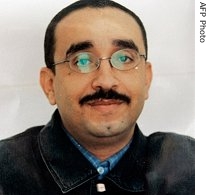2007年VOA标准英语-Egypt's Pro-Israel Spy Trials Raise Questions(在线收听)
Cairo
24 April 2007
Earlier this week an Egyptian court sentenced an Egyptian Canadian man to 15 years in prison for spying on behalf of Israel. In the same week, Egyptian authorities charged another man with giving Israel confidential reports on Egypt's nuclear program. The two cases have generated a lot of attention, speculation and questions. From VOA's Middle East Bureau in Cairo, Leslie Boctor examines the wider political effect these espionage cases have in the region.
 |
| Mohammed al-Attar flashes a victory sign as he is led into the Egyptian State Security Emergency Court in the New Cairo suburb of Cairo, 21 Apr 2007 |
Earlier this week, he was sentenced to 15 years in prison.
The prosecution said El Attar used his position at a Toronto bank and his ties to the gay community to track information on Arabs living in Canada. El Attar claimed he had been tortured and coerced into confessing to a crime he did not commit.
Israeli foreign ministry spokesman Mark Regev told the Associated Press "Israel categorically denies" any involvement in the case.
El Attar's case remains a tangle of contradictory facts and unanswered questions. His allegations of torture have not been investigated.
Earlier this month, Amnesty International released a scathing report on Egypt's use of torture in prisons and police stations.
Said Haddidi, a researcher with Amnesty International, says the country's emergency law has created a parallel emergency justice system that does not respect a suspect's right to a fair trial.
"People are not allowed prompt access to lawyers and the lawyers on the other hand are not allowed fair access to the documents," he said. "And when these defendants come before the court, they deny the charges brought against them, they say they have been tortured by state security services and there is no proper investigation in these allegations of torture."
Aside from questions of a fair trial, many are questioning the reasons and the timing behind the recent spy cases in Egypt.
 |
| An undated handout photo shows Egyptian engineer Mohamed Saber, employee of Cairo's atomic energy commission |
In a similar case five years ago, Egyptian engineer Sherif al-Filali was found guilty of spying for Israel and sentenced to 15 years in prison.
An editorial in the independent Masr il Youm newspaper said Egypt has become a "factory of spies," and the government is producing the spies as a ploy to draw attention away from domestic problems.
Emad Gad, an analyst with the Al Ahram Center, agrees. He says the authorities have arrested countless spies, but do not publicize all of them.
"Many spies have been arrested but the Egyptian authorities did not publish or ask the media to write about these issues because they solved these kind of issues with Israel through security organizations between Israel and Egypt," said Gad.
"But when they announce about a new spy or a network, I think, there is a political aspect to announce about this network," he added.
Egyptian trials of suspected Israeli spies have strained relations between Israel and Egypt, the first Arab nation to sign a peace agreement with Israel. Gad says because of the shifting power in the region, and Saudi Arabia's new willingness to work with Israel, Egypt has reason to reassert its position in the region.
He says the recent cases of espionage are likely intended to send a message to the Israelis and influence other Arab nations.
"I think perhaps they think that this issue is just a message to the Israelis that you cannot minimize the Egyptian rule and that Egypt can control the political operations in the region," he said.
"Egypt can convert its relations with Israel from warming up peace to perhaps cold peace and in a situation like that, cold peace or cold war, it is difficult for many Arab countries to deal with Israel," Gad continued.
In 1996 an Egyptian court sentenced Azzam Azzam, an Arab Israeli, to 15 years in prison for spying on behalf of Israel. Authorities said he had sent encoded messages in women's underwear from a Cairo textile factory using invisible ink. He was released in a prisoner swap with Israel.
Azzam maintains his innocence. He says he was tortured and signed a blank sheet of paper for his confession because he feared for his life. He says the Egyptian government uses the same tactics in other espionage cases.
Azzam says every so often, the Egyptian government and its secret service open their files and pull out a spy folder and simply change the names around. He says, "one time it was Sherif El-Felaly, the other Azzam Azzam and now El Attar - and there will certainly be more."
Although Egypt and Israel have been at peace for decades, Egyptians are still highly mistrustful of their Israeli neighbors. Among Egyptians, there are few crimes as damaging to a person's reputation as treason involving Israel.
With engineer Mohamed Saber's trial scheduled to start later this month, the rumor mill in Cairo is still in high gear, questioning if these men have really betrayed their country, and if so why.